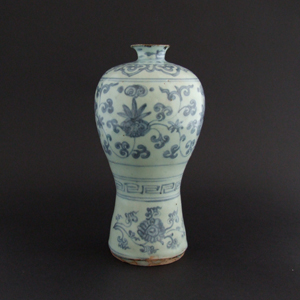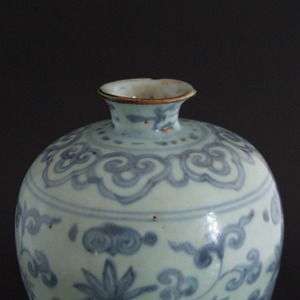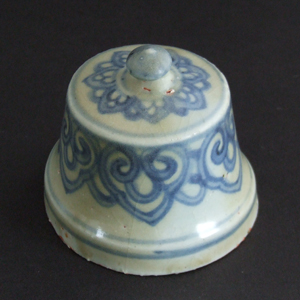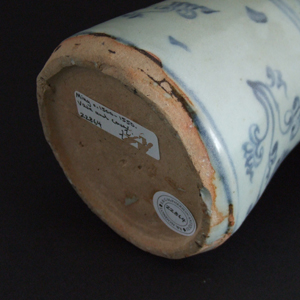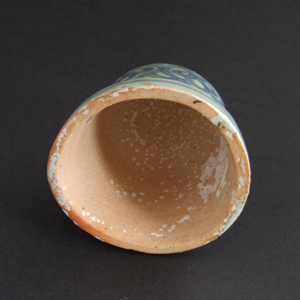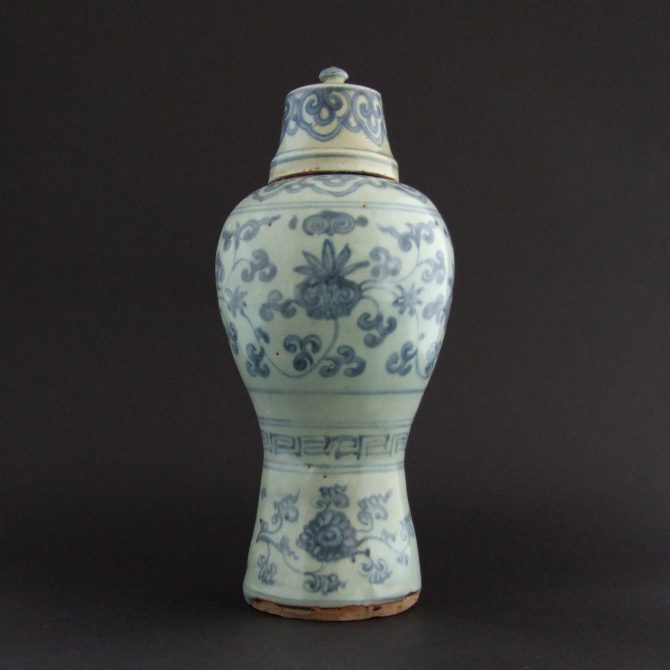
ZHENGDE or JIAJING 1506 – 1566 Ming Porcelain
A Ming Blue and White Porcelain Meiping Shaped Vase and Cover, Zhengde 1506-1521 or Jiajing !522-1566. Decorated with Two Panels of Scrolling Flowers, Chrysanthemum to the Lower Register and Probably Lotus to the Upper Section. The Shoulder of the Meiping and the Cover with a Repeated Band of Ruyi-Heads.
SOLD
- Condition
- Very good. The footrim with a small shallow chip c.10 mm x 2 increasing to 4 mm. The glaze is semi-matt in places, the glaze on the cover mostly has a greenish hue. The cover has some fine crazing.
- Size
- Height : 26.3 cm (10 1/3 inches).
- Provenance
- N/A
- Stock number
- 22864
- References
- For a blue and white Ming Meiping of this type from the Jiangxi Provincial Museum see : Yuan and Ming Blue and White From Jiangxi (Various authors Jiangxi Provincial Museum and the Art Museum, The Chinese University of Hong Kong, 2002) item 78.
Information
Ming Blue and White `Provincial` Porcelain :
Pieces like the present Ming Porcelain example have traditionally been referred to as `Provincial Blue and White Porcelain` because the potting and painted appear as being some what rustic. Sometimes `provincial` pieces have a great strength and freedom that can be lacking in more refined objects. Recent research in China has shown that there was little Blue and White Porcelain produced outside the main kiln complex of Jingdezhen in Jiangxi Province. The exception might be Dehua in Fujian province but the Blue and White Porcelain production from those kilns is distinct from the kilns at Jingdezhen.
Zhengde, Ming Emperor 1506-1521 :
Zhengde was his taken name as was the practice with Chinese emperors, he was born Zhu Houzhao in 1491, the son of Hongzhi(1488-1505). His accession to the Imperial thrown at the age of 14 was in 1506. Zhengde neglected state affairs which led to control first by the eunuchs, then to government by his favourites, these were frequently military men with little understanding of complex government. The relaxation of imperial control led to a rise in the status of the scholar-official class. Unlike his father, Zhengde was not interested in ruling and disregarded all state affairs. His actions have been considered reckless, foolish or pointless. There are many instances where he showed a lack of responsibility. He took up a luxurious and prodigal lifestyle and indulged himself in women. It was said that he liked to frequent brothels and even created palaces called "Pao Fang" outside the Forbidden City in Beijing initially to house exotic animals such as tigers and leopards for his amusements and then later used to house beautiful women for his personal enjoyment. On one occasion he was badly mauled while hunting tigers, and could not appear in court audiences for a month. On another occasion he burned down his palace by storing gunpowder in the courtyards during the lantern festival. For months at a time he would live outside the Forbidden City or travel around the country with heavy expenditures being paid from the empire`s coffer. While being urged to return to the palace and attend to governmental matters, Zhengde would refuse to receive all his ministers and ignored all their petitions. Zhengde also sanctioned the rise of eunuchs around him. One particular Liu Jin was notorious for taking advantage of the young emperor and squandered immense amount of silver and valuables. The corrupted wealth is about 36 million pounds of gold and silver. There was even rumour of a plot that Liu Jin had intended to murder the emperor and place his own grandnephew on the throne. Liu Jin`s plot was ultimately discovered, and he was executed in 1510 however the rise of corrupt eunuchs continued throughout Zhengde`s reign. In time Zhengde became notorious for his childish behaviour as well as abusing his power as emperor. One strange and somewhat comical event was when he created a staged commercial district inside his palace and ordered all his ministers, eunuchs, soldiers and servants of the palace to dress up and acted the role that he dictated ex. merchants or street vendors whilst Zhengde would walk through the scene pretending to be a commoner. Any unwilling participants especially the ministers (who viewed it as degrading and an insult) would be punished or removed from their post. Then in 1518 Zhengde declared himself General Zhu and personally led an expedition to the north claiming his intention to pacify the Mongol tribes but in the end did not accomplish much. Then again in 1519, Zhengde Emperor led another expedition to Jiangxi province to the south in hopes to quell a local prince`s revolt only to discover that the revolt has already been put down. Frustrated at not being able to lead his troops to victory, Zhengde ordered the release of the prince just so he could experience the chance to capture his prisoner for himself. In January of 1521, Zhengde had the rebel Prince of Ning executed in Tongzhou, an event that was recorded even by the Portuguese embassy to China.
